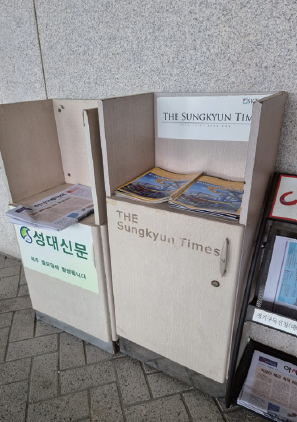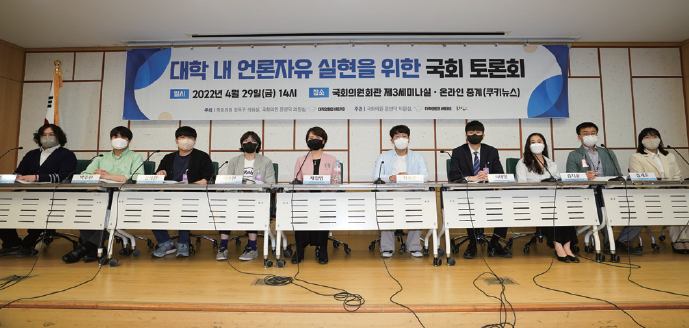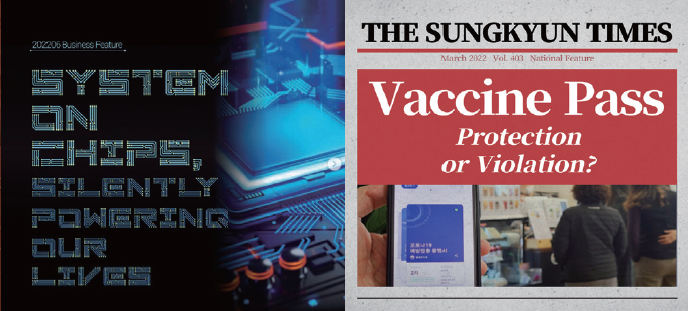The student press is an excellent example of student representative organizations on campus. Students participating in it focus on campus life or analyze diverse social issues and make it their job to report it to the rest of the student body. However, the student press is losing its identity as it suffers from fading interest. Therefore, the Sungkyun Times (SKT) would like to explore the origins of the student press, its limitations, and possible improvements.
Interseting Stories about the Student Press
Student Press, on the Road to Becoming a Real Press
The beginning of the student press in Korea goes back to the 1950s. At first, most presses were founded to promote schools or deliver news to local people. However, college students’ democratic awareness was enhanced through the April 19th Student Uprising and the May 16th Military Coup d’Etat. Since then, the student press became a voice for those eager to change society. During the 1970s and 80s, when the fever of student movements reached its peak, the role of the student press became increasingly important. Unlike the preexisting press, the student press published news against the military regime. For instance, the Sungkyunkwan University Weekly (SKKUW) featured an article titled “The Democratic Revolution” in their May 12th, 1980 issue to encourage the participation of Kingos in student movements. Likewise, the student press has been at the center of student movements. In the 1990s, however, the heat of student movements diminished due to the settlement of democracy, and the student press started to cover more diverse subjects regarding society and student lives.
The Voice of SKKU
Various press associations also operate at SKKU. There are three official organizations at SKKU: the Sungkyunkwan University Broadcasting Station (SUBS), the SKKUW, and the SKT. The school president controls and publishes news by these three associations during the semester. The SUBS, established in 1955, transmits audio broadcasts three days a week on campus and streams video broadcasts via online platforms such as YouTube. On the other hand, the SKKUW, established in 1954, publishes weekly newspapers. Articles published by the SKKUW include: “Did Spring, Which Passed the Turning Point, Bring a Spring Breeze?” The SKKUW mainly writes about school-related and social issues. Lastly, the SKT, founded in 1970, publishes monthly English magazines containing indepth analyses of diverse topics. Articles such as “College Mentorship Program: A Meaningful Activity for This Vacation” represent the characteristics of the SKT. Aside from these three, other presses exist at SKKU, such as the SKKUzine (the school’s online magazine), Jeongjeongheon (the feminism magazine), and the SungkyunJi (the SKKU magazine). In short, the student press of SKKU has been, and is, publishing and reporting news through Kingos’ hands.
Limitations of the Student Press
Constant Invasion of Editing Rights

Even though students should be the rightful leaders of the student press, editing rights are often not guaranteed. During the 1970s, when the student press took part in the student movements, there were frequent incidents of censorship and the suspension of publication. However, press censorship still remains a problem in disagreements between the press and the school. For instance, a student who will be referred to as Lee (Chief of the News Bureau of a broadcasting station in a university located in Seoul) regretfully said, “To resolve the curiosity of students, we tried to report the current condition of the mobile academic affairs information system. However, the report was rejected by the school.” Another reason for press censorship is that the student press closely linked to the school as a form of affiliate association or club. Since the press cannot be independent of the school, it is not easy to fully guarantee their editorial rights. For example, in 2019, a college newspaper in Seoul had to publish its newsletter blank, as the school disapproved of its article about the school board and the president.
People No Longer Care about the Student Press
A decrease in students’ interest with the decline in student movements is another crisis for the student press. Unlike in the past, when most college students focused on a common goal to preserve democracy, students nowadays are busy concentrating on their own lives. This tendency leads to indifference towards the student press. For example, according to a survey conducted by the Korea University Broadcasting Station (KUBS), over 70% of undergraduate respondents, said that they listen to KUBS’s broadcasts less than twice a week. Moreover, some claim that there is no need to watch or read reports by the student press, since the same news can be seen through other types of media as well. Lee Ga-eun (sophomore, Department of Confucian and Oriental Studies) said, “Of course, I have also seen newsstands full of unread school newspapers. Frankly, though, I also find it hard to take time off to read them.” Such indifference may lead to decreased recognition and threaten the survival of the student press. Lee, the Chief of the News Bureau, said, “Staff resignation has been occurring frequently lately, possibly due to the lack of interest. Now, there are only two staff members left in our department.

The Future of the Student Press
Attention to the Press! Genuine Trust from the University
Trust between the press and the school is crucial for the Newsstand at Business School Official Presses of SKKU student press to gain full autonomy. Since both share the same goal – the development and wellness of the students – the two organizations should try to understand each other’s positions. Only then will the disagreement between the two be solved. To do so, support from the readers is essential. For the student press to gain more readers, they could benchmark their past behavior and target the local residents as readers. For instance, Columbia Missourian, a newsletter of the University of Missouri, retained a diverse class of readers by dealing with various local issues and expanding its news coverage in cooperation with the local broadcasting station. Like this, the student press can gain trust from the school if they can establish their identity on their own. Based on this trust, a change in the system could occur. According to “A Parliamentary Debate to Ensure the Freedom of the Press in Universities,” 92.4% of university students need permission from the school to distribute publications on campus. If the regulations are reformed with the school’s agreement, the editorial rights of the student press could also be fully guaranteed.

So, What the Press Should Do Is...
The student press must also undergo change. A change in the composition that reflects the demand of readers could be a solution. For instance, last semester, the SKT changed the magazine composition by segmenting the “feature articles” section into the National and Business sections. Heo Yu-jeong, the former Editor-in-Chief of the SKT, said, “By changing the composition, we could fulfill the demand of readers eager to receive information from a specific section.” In addition, reports published by the press should always consider the audience. Inducing student readers by featuring employment information could be an effective way. Furthermore, as online media consumption has risen in modern society, adapting to such changes could eliminate barriers between the press and the student body. For example, Kim Soo-hyeon, the Editor-in-Chief of the SKKUW, said, “The SKKUW has recently established the Department of New Media, which produces Instagram card news and documentary films. Thanks to the department, many readers now feel closer to us.” Hence, the student press will be able to interact with its readers conveniently by developing online media content. With these changes, students might become more interested in the student press, and some might even apply to become part of the associations.

The student press is in danger. From external difficulties that make them hard to keep their dignity as a press to the lack of interest on the part of the students, the thorny road laid in front of the student press seems harsh. As such, we, the student press, need the support of students and must also undergo change ourselves. The SKT sincerely hopes that the presses of SKKU and the student press in Korea can overcome this adversity step by step.
